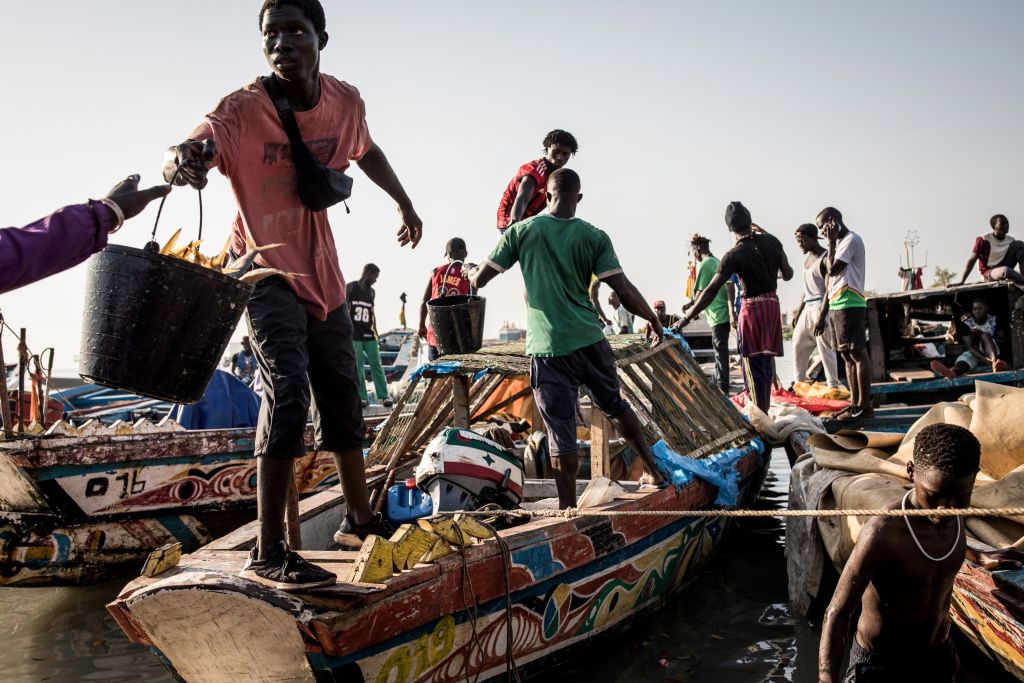Flag States Could be Sued for Illegal Fishing, Researchers Say
ADF STAFF
One way to curb illegal fishing might be to fine flag states for what their ships do thousands of kilometers away. A new report suggests that coastal states should consider going after flag states in court for a vessel’s misconduct in their waters. A flag state is where a vessel is registered.
A coastal state is the country where the fishing actually takes place, and it issues the authorization or license to fish there. For example, if a Russian-flagged vessel is operating within Ghana’s exclusive economic zone, Russia is the flag state and Ghana is the coastal state.
Advocates believe this added pressure could lead to reform.
“If flag states are responsible for the actions of their flagged vessels, then flag states should, logically, also be responsible for financially reimbursing the costs of pursuit, apprehension, arrest and any associated costs and fines of the illegal fishing vessel and its crew,” researcher Jessica Ford and co-authors wrote in the September issue of the journal Fish and Fisheries.
Seeds of the researchers’ plan were planted by a 2015 advisory opinion on IUU fishing from the International Tribunal for the Law of the Sea (ITLOS), which found that the flag state has a role in fisheries enforcement. Under the ITLOS opinion, a flag state could be held responsible in court for failing to enforce regulations related to IUU fishing and other sea crimes. It could cost flag states millions of dollars.
“The consequent potential economic liability should incentivize flag states to improve due diligence, state enforcement and oversight of their vessels,” the researchers wrote.
But the issue is complicated.
Foreign fishing boats are notorious for “flagging in” to African nations, meaning that they use and abuse local rules to flag a foreign-owned and operated fishing vessel into an African registry and fish in local waters. It helps a vessel’s beneficial owners dodge financial charges and other regulations.
There is little oversight of the online open registries. This means that a fishing company in China can register to fish in Ghana and pay the registration fee electronically. China, which has targeted West Africa since the 1980s, is the world’s worst IUU fishing offender, according to the IUU Fishing Index.
Sufficient monitoring, control and surveillance efforts often are lacking in African nations where IUU fishing is a problem. Illegal fishing is decimating fish stocks and the livelihoods of fisheries workers around the continent.
The Gambia, Guinea, Guinea-Bissau, Mauritania, Senegal and Sierra Leone, for example, lose $2.3 billion annually to illegal fishing, according to the Institute for Security Studies.
Could the Plan Work?
Steve Trent, chief executive officer and founder of the Environmental Justice Foundation, told ADF in an email that heagrees with the underlying motives of the plan. However, he is not sure it is feasible due to the many maritime security challenges faced on the continent.
“The identification, enforcement and prosecution of illegal fishing is in many cases an already complex and protracted procedure — the addition of international legal proceedings would risk grinding this to a halt, requiring human and legal capacity that many developing states in particular would simply not have.”
Trent said he believes a more attainable goal is to strengthen legal frameworks and enforcement capacity in-country, improve transparency measures, and enhance regional and international information-sharing. Those improvements, he said, would limit the options of illegal fishing vessels and reject vessels operating under flags to which they have no legitimate connections.
“I am not sure that the potential to obtain financial compensation through legal action would even be possible or be sufficient” due to existing challenges and complexities faced by many African nations, Trent said.
Duncan Copeland, executive director of Trygg Mat Tracking, told ADF in an email that he does not think the plan could be implemented anytime soon.
“I would suggest that the primary issue right now is the unwillingness or bare minimum effort by most flag states to cooperate with and assist coastal states in their efforts to investigate, prosecute and appropriately fine their flagged vessels when they are involved in illegal activities.”
Copeland said he believes greater cooperation is needed to hold a vessel’s beneficial owners liable for the ship’s activities.
“Quite rightly, it would be the individuals who perpetuated the illegal activity who are prosecuted [and/or] fined,” Copeland said.


Comments are closed.